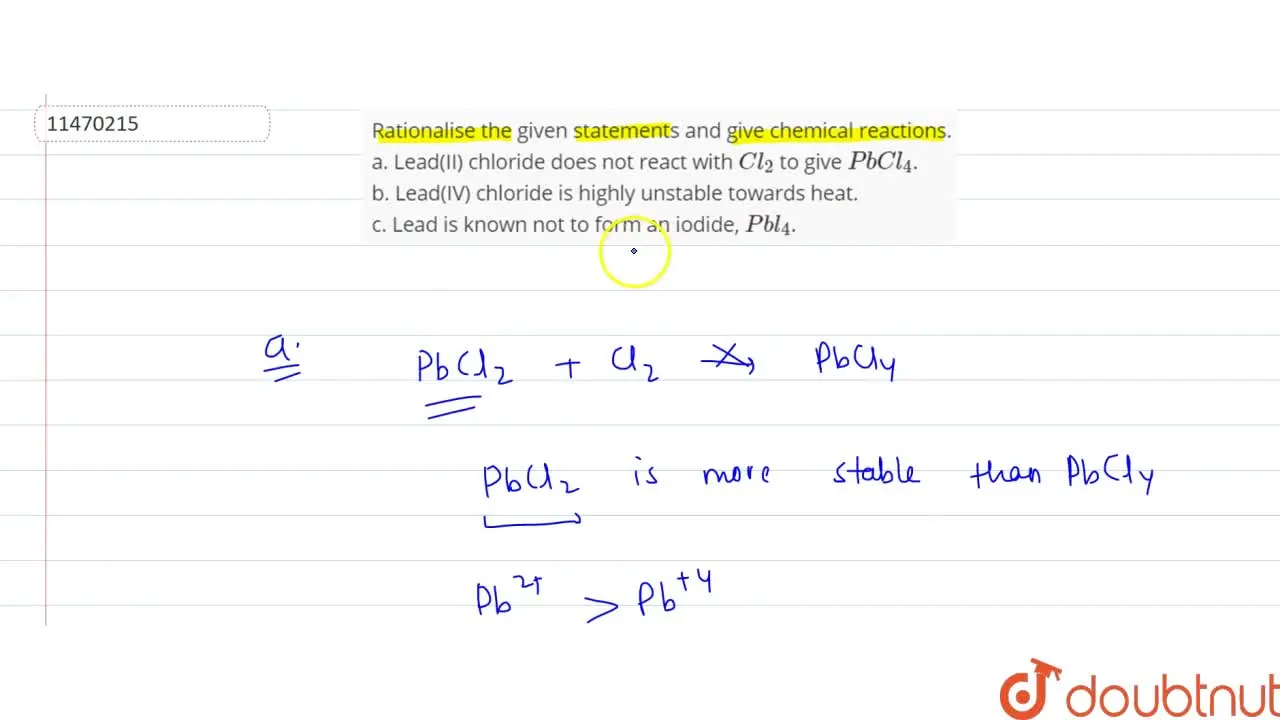Rationalise the given statements and give chemical reactions.
a. Lead(II) chloride does not react with Cl2 to give PbCl4.
b. Lead(IV) chloride is highly unstable towards heat.
c. Lead is known not to form an iodide, Pbl4.
(a) Lead (pb) in +2 oxidationstate i.e., pb (II) is more stable than in +4 oxidation state i.e., Pb (IV) this means that pb (II) chlride will not react with chlorine to form PB (IV) chloride
PbCl2(s)+Cl2(g)→PbCl4(g)
(b) Lead in (II) oxidation state is more stable than in lead in (IV) oxidation state. Therefore lead (IV) chloride is high unstable to heat. it decomposes upon heating to form lead (II) chloride.
PbCl4Heat−−→PbCl2+Cl2 ltrbgt Pb(IV)Pb(II)
(c) Lead is not known to form PBl4 because I− ion being a powerful reducting agent reduces Pb4+ ion to Pb2+ ion solution. These PbI2 is generally formed.
Pb4++2I−→Pb2++I2
Pb (IV) Pb(II)
Related Playlists
- BOOK - DINESH PUBLICATIONCHAPTER - P BLOCK ELEMENTS (GROUP 13 AND 14 )EXERCISE - Short answer type24videos
P BLOCK ELEMENTS (GROUP 13 AND 14 )
- BOOK - DINESH PUBLICATIONCHAPTER - P BLOCK ELEMENTS (GROUP 13 AND 14 )EXERCISE - Concept based55videos
P BLOCK ELEMENTS (GROUP 13 AND 14 )
- BOOK - DINESH PUBLICATIONCHAPTER - ORGANIC CHEMISTRY - SOME BASIC PRINCIPLES & TECHNIOUESEXERCISE - PURIFICATION & CHARACTERISATION OF ORGANIC COMPOUNDS38videos
ORGANIC CHEMISTRY - SOME BASIC PRINCIPLES & TECHNIOUES
- BOOK - DINESH PUBLICATIONCHAPTER - PHYSICAL AND CHEMICAL EQUILIBRIAEXERCISE - ULTIMATE PREPARATORY PACKAGE13videos
PHYSICAL AND CHEMICAL EQUILIBRIA
Similar Questions
Rationalise the given statements and give chemical reactions.
a. Lead(IV) chloride reacts with Cl2 to give PbCl4.
b. Lead(IV) chloride is highly unstable towards heat.
c. Lead is known not to form an iodide, Pbl4.View SolutionRationalise the given statements and give chemical reactions.
a. Lead(II) chloride does not react with Cl2 to give PbCl4.
b. Lead(IV) chloride is highly unstable towards heat.
c. Lead is known not to form an iodide, Pbl4.View SolutionGive suitable reasons for the following :
Lead (IV) Chloride is highly unstable towards heat.View SolutionBenzoyl chloride on reduction with H2 in the presence of Pd−BaSO4 gives benzaldehyde. What is this reaction known as ?
View SolutionTin and lead form divalent Sn (II) and ead (II) and tetravalent i.e., Tin (IV) and lead. (IV) compounds. Tetravalent and dioxides of lead and Tin are amphoteric in nature. Lead tetra fluorite is ionic solid where as PbCl4 is covalent. Pbl4 does not exist. lead (II) halides are white whereas Pbl2 is yellow in colour.
Q. Pbl4 does not exist due toView SolutionTin and lead form divalent Sn (II) and lead (II) and tetravalent i.e., Tin (IV) and lead. (IV) compounds. Tetravalent and dioxides of lead and Tin are amphoteric in nature. Lead tetra fluorite is ionic solid where as PbCl4 is covalent. Pbl4 does not exist. lead (II) halides are white whereas Pbl2 is yellow in colour.
Q. SnCl2 is solid whereas SnCl4 is liquid, this is because?View SolutionTranslate the following statements into chemical equations and balance them:
(i) Lead nitrate reacts with sulphuric acid to form a precipitate of lead sulphate and nitric acid.
(ii) Magnesium burns in the presence of nitrogen to form magnesium nitride.
(iii) Aluminium metal strip is added in hydrochloric acid to produce aluminium chloride and hydrogen gas.View SolutionHow many moles of lead (II) chloride will be formed from a reaction between 6.5g PbO and 3.2g HCI?
View SolutionHow ethanol reacts with the following ? Give chemical reactions.
(a) Acidified Potassium dichromate (b) Hot conc. H2SO4 (c ) Sodium (Na).View SolutionTin and lead form divalent Sn (II) and lead (II) and tetravalent i.e., Tin (IV) and lead. (IV) compounds. Tetravalent and dioxides of lead and Tin are amphoteric in nature. Lead tetra fluorite is ionic solid where as PbCl4 is covalent. Pbl4 does not exist. lead (II) halides are white whereas Pbl2 is yellow in colour.
Q. Reaction of SnO with NaOH givesView Solution


